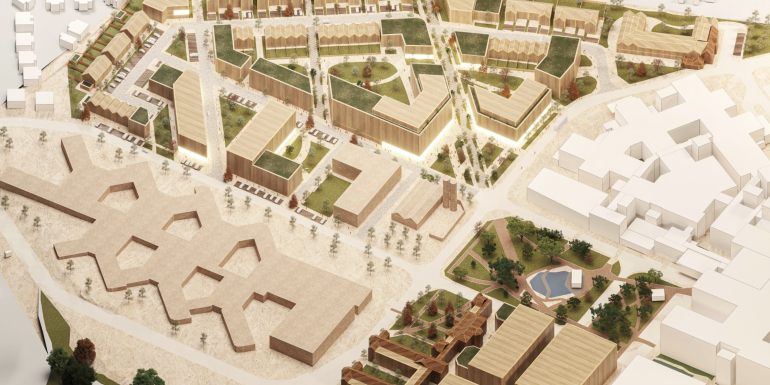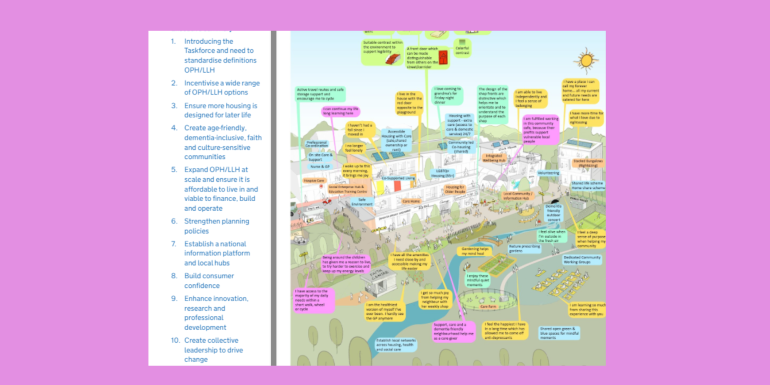What’s in a name? How we choose to describe our retirement communities
We’re often asked what exactly an ExtraCare village is.
“Is it a care home?”
“What’s the difference between a care home and a retirement village?”
Both types of housing can be excellent, but are often suited to different circumstances.
What is a care home?
In a care home (also sometimes known as a nursing or residential home), residents usually have a bedroom, often with en suite, and the rest of the living areas are limited and communal.
People living in a care home generally pay weekly or monthly for their accommodation, care and meals, rather than purchasing a property outright.
Staff will provide personal care to each resident, such as help with washing, dressing or taking medication. Some residents may need more significant care which is provided by on-site nursing staff.
Although there may be regular activities, there is usually less emphasis on independence.
What is a retirement village?
In contrast, retirement villages promote independent living for as long as possible.
In a retirement village, people live in self-contained homes with their own front door – usually containing a living room, kitchen, bathroom and one or more bedrooms.
At most ExtraCare locations, properties are available for purchase, shared ownership and rental.
Residents and local older people have access to a range of on-site health and leisure facilities in our villages, as well as an active programme of social events. Our well-being programme supports residents to proactively manage their own health, and, as a charity, we are constantly researching and innovating new ways to help our residents live better lives for longer.
Some residents may need some extra help from a care team to support them to live independently. This may range from a simple drop-in visit to assist with meal preparation or housework up to help with more significant care needs. Care can, within reason, increase or decrease, depending on a resident’s individual requirements. Emergency support is also available, in addition to care agreed in advance with staff as part of a care package.
Residents receiving care are still able to be a valued part of the village’s social life, and the community as a whole may not know which residents receive care.
People may choose move to one of our villages as an alternative to moving into a care home – or they might move out of a care home to come to one of our communities and live more independently. One of our Care Managers estimates that she’s supported more than 50 residents to do this in the last five years.
How to describe our retirement communities
Our locations are often called retirement villages, retirement communities, independent living, extra care housing, and a variety of other terms. Our preferred term is “retirement communities”.
When we talk to residents, relatives, local authorities, journalists, or one of the many professionals that we deal with every day, we use these words. These all illustrate what we can offer to prospective residents, and don’t generally have any of the more negative connotations of care homes.
We know that the term care home doesn’t describe our villages at all. Many of our residents have spoken to us about the phrase; they don’t want it to be used to describe the vibrant retirement communities where they live. For many people, care homes are associated with ill-health, frailty and a lack of independence. We understand our residents’ concerns about this.
So why use other terms?
The problem is that care home is still the default term for “housing for older people”. A lot of people who don’t have much experience or knowledge of the options available tend to use the phrase “care home”, even if they know it’s not quite what they want.
On average, around 3,600 people search online for “retirement village” each month in the UK. In contrast, more than 22,000 search for “care home”[1].
So, if we want to get our message across to a potential audience, we sometimes need to use the phrase “care home” online. We want to let people know that our retirement communities are an option, but we can only do that if we use the same language that prospective enquirers are using to search for us.
Therefore, on our website, we’ve chosen to use the term “care home” in the meta data, which is the bit of the background website code that Google sees. But we don’t say that we provide care homes – we are always honest and transparent about what it is we actually do. We can describe ourselves honestly as an “alternative to the traditional care home” for some of our residents: we are able to provide them with the care that they need and still allow them to keep their independence.
This means that search engines can direct people to our site, where we prefer to use the phrases “retirement village” and “independent living” to explain more fully and accurately what ExtraCare offers.
We see it as a way of informing people about their options.
We can’t control what other people do
Neighbours, professionals and journalists sometimes call our villages “care homes” when talking about them. When possible, we try and correct them and spread the word about retirement villages. Many of our residents feel very strongly about this, and we encourage them to speak up as well if they aren’t happy.
But we know that the change in language won’t happen overnight, and sometimes we have to accept that people won’t use our preferred wording.
Lark Hill Village in Nottingham was featured in the Channel 4 show Old People’s Home for 4 Year Olds last year. We didn’t get to choose the name of the programme, but we felt that our involvement would be positive for the village and the sector as a whole.
And we were right! The residents involved found it to be a good experience, and, despite the name of the show, Google searches for “retirement village” doubled month-on-month[2]. It was such a good opportunity to inform people about retirement communities, and we couldn’t pass it up just because of the language that the production company used.
Around 2 million people watched the programme, and over the series’ run, we had more than 50,000 new visitors to our website[3]. Thousands of people learnt about the concept of retirement villages from the show – and having more awareness of their options can only be a good thing.
Going forward
Anecdotally, over the past few years, thanks to the work of our colleagues at ARCO and other organisations, we’ve seen the awareness of alternative retirement community options come a long way – hopefully within a short time, the default term will be a more appropriate one!
About the author in her own words:
"I have worked for ExtraCare for eight years. I love the variety of life with ExtraCare, how living here can change people’s lives, and working with colleagues who truly believe in creating better lives for older people. For me, the best part of working in this sector is being able to spend time with our residents and remember why we’re here, and I think it’s something that all of our sector colleagues should try to do more often. "





